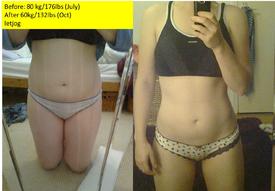Shinsplints

PaulaStrom
Posts: 3 Member
Does anyone have advice to help with shinsplints besides ice and calf stretching?
0
Replies
-
I get them when it's time for a new pair of shoes. Have you been properly fitted for shoes? If not, that is your first step. Otherwise rest takes care of it for me.0
-
Any time you are sitting, elevate your legs.0
-
Yeah, rest...and try different shoes...I run with minimal support now and I have no more shinsplints. If you do choose to change footwear or even go minimalist, please run like you are starting over...that is, take it slowly, even if it feels great...0
-
Calf stretching before and after running/jogging/walking is probably the best. I do this and no longer have shinsplints.0
-
a really good pair of running shoes
 0
0 -
I agree with the rest/ice (on/off for 20 minutes, but not for more than a couple hours). But then after a day of rest I would suggest hopping on an elliptical and going backwards. This helped me a lot when I would get them. I couldn't change my shoes (money...) and I couldn't just rest (because it was in PE in high school) so I found that either walking backwards or doing the elliptical backwards helped to work the muscle in a different way.
Good luck!0 -
Foam roller or "the stick" on calves, quads and hammys!!0
-
I get them when it's time for a new pair of shoes. Have you been properly fitted for shoes? If not, that is your first step. Otherwise rest takes care of it for me.
First of all THIS ^^^.
Then, stretching after a warmup and ibuprofin and rest as needed. Let it heal before you really injure yourself.0 -
My shin splints turned out to be a dislocated ankle.0
-
Foam rollers are nice. Rest and elevate. Do low impact exercises until theyre healed. They can be caused by the wrong running shoes, i.e. worn out, improperly fitted, cheap, etc. Taking on too much mileage too quickly will cause this too. You have to go easy and maybe consider a very cushioned shoe such as a Brooks Ghost or Asic Gel-Nimbus. Also watch your running form. Try to avoid heel striking and land midfoot. (Although heel striking is unavoidable when doing hill runs) Hope this helps.0
-
Foam rollers are nice. Rest and elevate. Do low impact exercises until theyre healed. They can be caused by the wrong running shoes, i.e. worn out, improperly fitted, cheap, etc. Taking on too much mileage too quickly will cause this too. You have to go easy and maybe consider a very cushioned shoe such as a Brooks Ghost or Asic Gel-Nimbus. Also watch your running form. Try to avoid heel striking and land midfoot. (Although heel striking is unavoidable when doing hill runs) Hope this helps.
This and -
I used to get them when I tried to add too many miles to soon. I slowed down, watched my form and the muscles soon caught up to my endurance. Lots of stretching, ice, and ibuprofen always helped in the beginning.0 -
Don't run so much!0
-
WOW, lots of great advice!
 I know why I got them...I was a runner until 2001 when I pushed too hard trying to get my spit time down. Sudden onset of SEVERE shinsplints. Ran thru them for 6 months and just couldn't anymore. Quit running, gained 80 pounds. :sad: I have lost 40 of it with diet and walking (since August of 2012) and wanted to try jogging. Was doing great until :frown: pushed too hard and fast a few days ago and lo and behold they are back, but not as bad. I immediately backed off to walking/icing/ibuprophen. My shoes are new and good...New Balance 890v. I have never heard of "foam rollers". What are they? 0
I know why I got them...I was a runner until 2001 when I pushed too hard trying to get my spit time down. Sudden onset of SEVERE shinsplints. Ran thru them for 6 months and just couldn't anymore. Quit running, gained 80 pounds. :sad: I have lost 40 of it with diet and walking (since August of 2012) and wanted to try jogging. Was doing great until :frown: pushed too hard and fast a few days ago and lo and behold they are back, but not as bad. I immediately backed off to walking/icing/ibuprophen. My shoes are new and good...New Balance 890v. I have never heard of "foam rollers". What are they? 0 -
It's a tubular piece of foam maybe about 8 or 10" in diameter. You roll your sore muscles over it. Example: I'm sitting here with my quads killing me from squats one day and hill runs the next. I'm using a rolling pin to massage them. It makes a huge difference! Look in the back of Runner's World and you'll see advertisements for foam rollers. Local running stores may have them in stock as well. My gym has them too.0
-
A Co-worker has a personal trainer that fixed hers 5 minutes prior to her workout. He elevated her leg and rolled a 1 inch diameter
wooden peg up and down her leg from her knee to her ankle with slight pressure. (somewhat painful) Afterwards the area was painful to the touch, but the pain went away. And to prevent in the future, run with no less than a 3 percent incline on the treadmill.0 -
And to prevent in the future, run with no less than a 3 percent incline on the treadmill.
Huh? Where did that nugget of info come from? 3%? Who runs uphill 100% of the time? That's an injury waiting to happen. If you had to use a minimum incline of 3% to prevent shin splints-I'd have some serious shin splints. Proper shoes, stretching, strengthening the calf muscles, ramping up speed & mileage slowly-that will help. Running continually uphill? Well-you're welcome to try it.0 -
Regarding the foam rollers - I've heard that you should always roll towards the heart. Don't roll in two directions - you can damage lymph nodes and small blood vessels.Your lymph system basically works as a siphon and doesn't handle getting pushed and pulled too well.0
This discussion has been closed.
Categories
- All Categories
- 1.4M Health, Wellness and Goals
- 398.1K Introduce Yourself
- 44.7K Getting Started
- 261K Health and Weight Loss
- 176.4K Food and Nutrition
- 47.7K Recipes
- 233K Fitness and Exercise
- 462 Sleep, Mindfulness and Overall Wellness
- 6.5K Goal: Maintaining Weight
- 8.7K Goal: Gaining Weight and Body Building
- 153.5K Motivation and Support
- 8.4K Challenges
- 1.4K Debate Club
- 96.5K Chit-Chat
- 2.6K Fun and Games
- 4.8K MyFitnessPal Information
- 18 News and Announcements
- 21 MyFitnessPal Academy
- 1.5K Feature Suggestions and Ideas
- 3.2K MyFitnessPal Tech Support Questions














